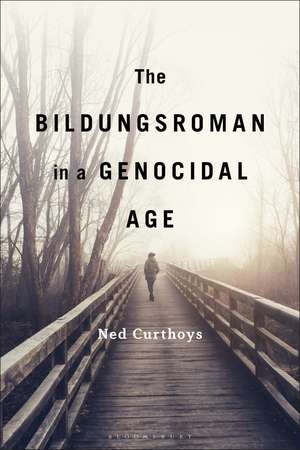The Bildungsroman in a Genocidal Age
Autor Dr. Ned Curthoysen Limba Engleză Hardback – 7 feb 2024
Preț: 495.86 lei
Preț vechi: 687.61 lei
-28% Nou
Puncte Express: 744
Preț estimativ în valută:
94.90€ • 98.03$ • 78.98£
94.90€ • 98.03$ • 78.98£
Carte tipărită la comandă
Livrare economică 25 martie-08 aprilie
Preluare comenzi: 021 569.72.76
Specificații
ISBN-13: 9798765103890
Pagini: 168
Dimensiuni: 152 x 229 x 17 mm
Greutate: 0.39 kg
Editura: Bloomsbury Publishing
Colecția Bloomsbury Academic
Locul publicării:New York, United States
Pagini: 168
Dimensiuni: 152 x 229 x 17 mm
Greutate: 0.39 kg
Editura: Bloomsbury Publishing
Colecția Bloomsbury Academic
Locul publicării:New York, United States
Caracteristici
First sustained narrative analysis of the Bildungsroman as an explorative psychological genre and contributing to the nascent field of perpetrator studies; reflects on contemporary genre studies and is the first sustained study of the contemporary Bildungsroman as shaped by by the imperatives of historical fiction
Notă biografică
Ned Curthoys is Senior Lecturer in English and Literary Studies at the University of Western Australia. He is the author of The Legacy of Liberal Judaism: Ernst Cassirer and Hannah Arendt's Hidden Conversation (2013).
Cuprins
Acknowledgments 1. Memory as reinvention in Kazuo Ishiguro's The Remains of the Day2. Visionary disenchantment: Accessing second sight in The Kindly Ones3. An exemplary Bildungsheld: Bringing diaspora home in Daniel Stein Interpreter4. Unofficial education and the promotion of active readership in two Holocaust themed novels for children: Hitler's Daughter and The Boy in the Striped Pyjamas5. The Counterfeiters as Bildungsfilm: Allegorizing Jewish history6. A protagonist for dark times: Repurposing memory and the future of civil courage in Margarethe von Trotta's biopic Hannah Arendt ConclusionNotesBibliographyIndex
Recenzii
The Bildungsroman in a Genocidal Age brings fresh and insightful approaches to contemporary fictional and cinematic texts, combining astute close readings alongside a range of theoretical prisms. Revisited as a highly mobile, fluid, multifaceted genre, the Bildungsroman - in adult and children's fiction alike - ispersuasively showcased as a pedagogical "off-piste" roadmap to equip readers, including fledgling future citizens, with the wherewithal to challenge the reductive rigidity of homogenizing dominant hegemonies. This book regards Bildung as vital questing counter-narratives of cosmopolitan "ethical awakening" that seek to dismantle patriarchy's stranglehold on historical, religiocultural and familialmatrices, and remap the trajectory of humanity's formation.
In this scrupulous and insightful study which links Bildungsroman theory and memory studies, Curthoys once again demonstrates the unique adaptability of the Bildungsroman genre. Eschewing the simple language of paradox when describing the seemingly unlikely coupling of the Bildungsroman and the Holocaust, Curthoys demonstrates that even in its encounter with the reality of genocide, and even when it focuses on protagonists complicit in the most harrowing violence, the Bildungsroman nonetheless continues to function as a genre uniquely positioned to meticulously examine the complexities of individual self-fashioning and self-exploration.
In this scrupulous and insightful study which links Bildungsroman theory and memory studies, Curthoys once again demonstrates the unique adaptability of the Bildungsroman genre. Eschewing the simple language of paradox when describing the seemingly unlikely coupling of the Bildungsroman and the Holocaust, Curthoys demonstrates that even in its encounter with the reality of genocide, and even when it focuses on protagonists complicit in the most harrowing violence, the Bildungsroman nonetheless continues to function as a genre uniquely positioned to meticulously examine the complexities of individual self-fashioning and self-exploration.
